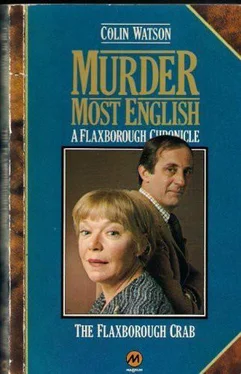“The question of your whereabouts at eight o’clock on the evening of the twelfth.”
Brennan cast a quick look at Miss Teatime, but she remained in patient contemplation of the inspector’s face.
“Have you any objection,” Purbright asked, “to our making a search of your property, sir?”
“Of course I have. I object very strongly to the way I am being treated as a criminal. But if you want to waste your time looking for what is not here, by all means look. I need hardly say that this whole affair will be brought to the notice of your Foreign Ministry.”
“Very well, sir. If you will kindly remain where you are for a few minutes... Oh, and perhaps the lady would be good enough to wait outside in the corridor.”
Purbright and Love searched less astutely than Miss Teatime had done, but a good deal more industriously. Love, whose duties had afforded him a similar opportunity only once before in his life, found it highly enjoyable and determined to drag it out. More than once, Purbright had to point out to him that no degree of criminal ingenuity was likely to have succeeded in secreting a stethoscope within a stud box or submerging it in a bottle of after-shave lotion.
They finished at last, however, and the inspector presented himself to the cooler but still resentful Brennan.
“Would you mind coming down with us to the garage, sir?”
They walked in silence along the corridor, passing Miss Teatime at the first turn. She waited a moment, then followed quietly a few yards behind.
Brennan, invited by Purbright to walk ahead, led the two policemen into the roofed enclosure and stood beside the grey Hillman. He was quite calm now. As he handed the inspector a key, he made the slightest of bows.
Purbright opened the car door.
The two cases were in the same position, but the raincoat had been pushed into one of the compartments beneath the facia. Purbright drew it out and unrolled it. Holding it up, he shook it. Of the scarf, or whatever had been wrapped in the coat before, there was now no sign. He folded the coat and laid it on the seat.
Love was busy excavating and scrutinizing the contents of the boot. He found a foot pump, a tin box with a few small tools in it, a deflated beach ball, some rope, a folded canvas stool, a lemonade bottle half filled with a liquid which he decided, after careful sniffing, to be paraffin, and a much worn tyre.
By the time Love had loaded these back again, the inspector had completed his examination of the inside of the car and was about to open the smaller of the two cases with one of the pair of keys helpfully volunteered by Brennan.
The case contained, as he had guessed, a range of small sample bottles and packs of capsules. All bore labels under the Elixon imprint.
Purbright locked it again, replaced it on the seat, and pulled forward the larger case.
Sergeant Love looked over the inspector’s shoulder as the lid was raised.
He could not have put names to more than two or three of the things he saw revealed, but he knew that they were pieces of diagnostic equipment of a kind he had seen from time to time in surgeries and hospitals. He recognized an instrument for looking into ears. Another, a sort of barometer, was similar to one by which he once had had his very normal blood pressure measured. There were slim chrome torches, rubber-headed mallets, thermometers in transparent pocket cases, stainless steel spatulas. All were sealed in polythene and neatly arranged in compartments. Love gazed admiringly at their workmanship and pristine brightness. No wonder, he reflected, that it cost so much to set up as a doctor.
“Go on, inspector,” he heard Brennan say quietly, “There’s more under those.”
Purbright gave the top section a pull. It lifted and hinged back. He reached into the bottom of the case and drew up something black and tubular and flabby.
The sergeant very nearly said, “Ah!”
Then Purbright’s hand went again into the case.
Another stethoscope emerged.
Then another. And another.
By now, the inspector was looking rather like a man who had unwisely allowed himself to assist in some bizarre and protracted feat of conjuring.
Brennan, his face expressionless save for a slight thrusting forward of his lips that gave him something of a proprietory air, looked on.
The seventh, and final, stethoscope joined the bundle in Purbright’s left hand. He stood up. Love gazed with open wonder at the collection.
Brennan smiled.
“And which one,” he asked, “am I supposed to have stolen, inspector?”
It was a good question, Purbright bitterly reflected. Unless an answer presented itself pretty quickly, it was a winner.
He diligently examined the seven stethoscopes, comparing one with another. All seemed brand new and of exactly the same pattern. Their design, though, was unconventional—or so he supposed—for at the union of the earpieces was a small black box fitted with a rocker switch. A metal strip riveted to the top of this box carried the word Elixon in red.
“These are manufactured by your firm, are they, sir?”
“No, but they are made to our specification.”
“And you sell them?”
“I do not think you quite understand, inspector. All this”—he made general indication of the stethioscopes and the other contents of the case—“is just a small extra service that we are pleased to perform for the medical profession. Doctors find them very acceptable, I think.”
“You mean they’re free gifts?”
Brennan received this interpretation coldly. “They are gestures that help to maintain good will between one profession and another, that is all.”
“Rather expensive gestures,” Purbright remarked. He was looking closely at the stethoscope he had kept in his hand after dropping the others back in the case. “I don’t know much about these things, but this seems to be of fairly advanced design.”
“Oh, it is. This type is extremely sensitive. Electronics, of course.”
Brennan moved close. He held the black box lightly in his open palm.
“In here are the transistors, battery, and so forth. It is a very small radio set, in fact.” His fingers, the inspector noticed, bore several black grease smears. “You simply press this switch and you can hear a heart making a noise like an ocean liner.”
Purbright gave the switch experimental pressure, but Brennan shook his head.
“No, no—it is designed to work only when the earpieces are extended in use. To prevent accidental battery wear, you see.”
“And what’s this?” The inspector peered at the lettering he indicated with one finger immediately below the switch.
“ Verstärker —amplifier,” Brennan explained.
For some time Purbright continued to stare at the tiny moulded letters. Then, without taking his eyes off them, he beckoned.
“Sergeant...”
Love, who had been stooping to look under the car, stood upright and came to Purbright’s side.
“Read that out loud, will you.” Purbright told him.
“Vurze...” He hesitated, and made a second attempt. “Vurzetarker...” He looked inquiringly at the inspector. “Is that right?”
“It will do, sergeant. It will do very nicely.”
Love withdrew and resumed his painstaking scrutiny of the car’s underbelly, watched impassively by Miss Teatime.
“Did Dr Meadow,” Purbright asked Brennan, “possess one of these stethoscopes?”
“No. They are a completely new line. As a matter of fact, I intended to give him one that day when he collapsed. If you remember, I was waiting to see him.”
“And you had it on you, did you?”
Brennan agreed, almost eagerly, that he had indeed been carrying the instrument intended for Dr Meadow.
“Of course!” he exclaimed. “This lady must have noticed it sticking from my pocket and concluded that I had stolen it!”
Читать дальше












